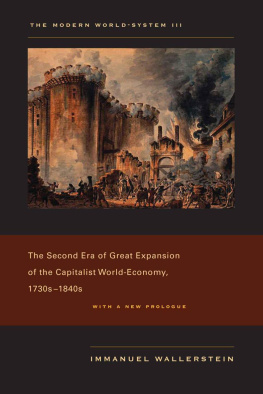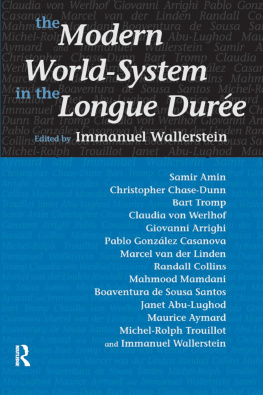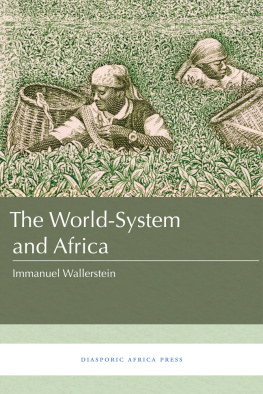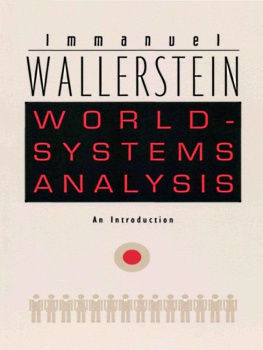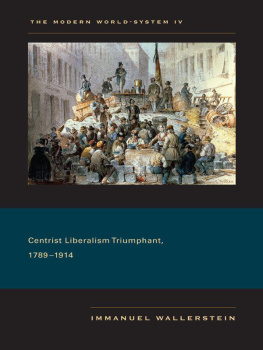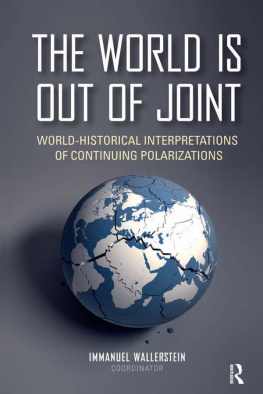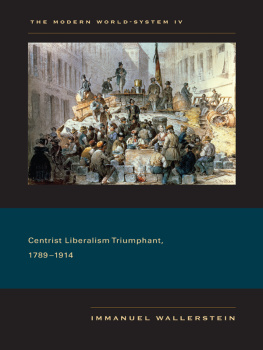Wallerstein - The Modern World-System II
Here you can read online Wallerstein - The Modern World-System II full text of the book (entire story) in english for free. Download pdf and epub, get meaning, cover and reviews about this ebook. year: 2011, publisher: University of California Press, genre: Politics. Description of the work, (preface) as well as reviews are available. Best literature library LitArk.com created for fans of good reading and offers a wide selection of genres:
Romance novel
Science fiction
Adventure
Detective
Science
History
Home and family
Prose
Art
Politics
Computer
Non-fiction
Religion
Business
Children
Humor
Choose a favorite category and find really read worthwhile books. Enjoy immersion in the world of imagination, feel the emotions of the characters or learn something new for yourself, make an fascinating discovery.

- Book:The Modern World-System II
- Author:
- Publisher:University of California Press
- Genre:
- Year:2011
- Rating:3 / 5
- Favourites:Add to favourites
- Your mark:
- 60
- 1
- 2
- 3
- 4
- 5
The Modern World-System II: summary, description and annotation
We offer to read an annotation, description, summary or preface (depends on what the author of the book "The Modern World-System II" wrote himself). If you haven't found the necessary information about the book — write in the comments, we will try to find it.
Wallerstein: author's other books
Who wrote The Modern World-System II? Find out the surname, the name of the author of the book and a list of all author's works by series.
The Modern World-System II — read online for free the complete book (whole text) full work
Below is the text of the book, divided by pages. System saving the place of the last page read, allows you to conveniently read the book "The Modern World-System II" online for free, without having to search again every time where you left off. Put a bookmark, and you can go to the page where you finished reading at any time.
Font size:
Interval:
Bookmark:
THE MODERN WORLD-SYSTEM II
Mercantilism and the Consolidation of the
European World-Economy, 16001750

World Map, by Joan Blaeu, 1638, from the Atlas Major. Joan Blaeu and his father Willem were the most respected cartographers of their time. Their maps were required on all Dutch ships engaged in trade with the Indies. Atlases replaced sheet maps as the dominant cartographic form in the seventeenth century. In 1670, Joan Blaeu was appointed Map Maker in Ordinary to the Dutch East India Company (VOC).
MODERN WORLD
SYSTEM II
Mercantilism and the Consolidation of the
European World-Economy 16001750
WITH A NEW PROLOGUE
Immanuel Wallerstein

University of California Press, one of the most distinguished university presses in the United States, enriches lives around the world by advancing scholarship in the humanities, social sciences, and natural sciences. Its activities are supported by the UC Press Foundation and by philanthropic contributions from individuals and institutions. For more information, visit www.ucpress.edu .
University of California Press
Berkeley and Los Angeles, California
University of California Press, Ltd.
London, England
Previously published in 1980 by Academic Press, Inc.
2011 by The Regents of the University of California
ISBN 978-0-520-26758-9 (pbk. : alk. paper)
The Library of Congress has catalogued an earlier edition of this book as follows:
Library of Congress Cataloging-in-Publication Data
Wallerstein, Immanuel Maurice, Date.
The modern world-system.
(Studies in social discontinuity)
Includes bibliographies and indexes.
1. EuropeEconomic conditions. 2. Economic history16th century.
3. Capitalism. I. Title. II. Series.
HC45.W35 1974 330.94 73-5318
ISBN 0-12-785923-3 (v. 2) (hardcover)
ISBN 0-12-785924-1 (v. 2) (paperback)
Manufactured in the United States of America
20 19 18 17 16 15 14 13 12 11
10 9 8 7 6 5 4 3 2 1
This book is printed on 50# Enterprise, a 30% post consumer waste, recycled, de- inked fiber and processed chlorine free.
It is acid-free, and meets all ANSI/NISO (Z 39.48) requirements.
To Fernand Braudel
. |
. |
. |
. |
. |
. |
. |
The illustrations were selected and annotated with the assistance of Sally Spector.
The following persons read one or more chapters of the manuscript and gave me the benefit of their detailed comments and/or objections: Perry Anderson, Sven-Erik strm, Nicole Bousquet, Stuart Bruchey, Aldo de Maddalena, Emiliano Fernndez de Pinedo, Andr Gunder Frank, Walter Goldfrank, Terence K. Hopkins, Hermann Kellenbenz, E. H. Kossmann, Witold Kula (and associates), Hans Medick, Birgitta Odn, and C. H. Wilson. I thank them all.
Previous versions of the following chapters have appeared elsewhere: Introduction and , in Caribbean Yearbook of International Relations (1978).
This volume starts with the question of how to describe what was going on in Europe during the seventeenth century. The great debate of the 1950s and 1960s about the crisis of the seventeenth century laid a great deal of emphasis on the feudal character of its processes. Most authors interpreted this to mean that there was a refeudalization of Europe. Volume 2 is an attempt to refute these characterizations and to insist once again that the European world-economy had become definitively capitalist during the long sixteenth century. In many ways, volume 2 is the crucial volume of the whole set in that it makes the case for a certain vision and definition of capitalism as a historical system.
Many readers have found this aspect of the work the hardest part to accept. It seems perhaps useful, therefore, to try to restate this argument more theoretically, and to indicate why I believe that what we call feudalism in Europe of the late Middle Ages is fundamentally different from the so-called second feudalism of early modern times.
The second new and important theme developed in this volume is that of hegemony. Here, too, many persons, even those sympathetic to the overall effort undertaken by world-systems analysis, have misunderstood the argument about the concept of hegemony. So it is perhaps useful also to try to restate exactly what I mean by hegemony and why I think it is a crucial concept in understanding how the modern world-system operates.
The intellectual question is whether one can argue that there existed a European world-economy that was a capitalist world-economy in the period 14501750. Actually, this constitutes two questions, not one: whether Europe (or some part thereof) constituted a singular economic entity in this period with a singular axial division of labor, and whether this entity can be described as capitalist.
The argument starts from a premise, which is both conceptual and empirical. The premise is that there are phenomena known as logistics (Rondo Camerons phrase), which are more frequently called in the French literature trends sculaires. These are presumably very long cycles, consisting of an inflationary A-phase and a deflationary B-phase. That such logistics exist seems to be widely, but not universally, taken for granted in the literature of European economic historians concerning both the late Middle Ages and early modern Europe. Empirically, the dating most frequently found in the literature is as follows:

I am going to take the existence of these logistics and their dating as givens.
The logic of the argument is essentially the following: There are certain basic similarities between the medieval logistic and the early modern logistic, which permits us to call both of them logistics with A and B phases. However, a careful comparison of the two will show certain significant qualitative differences, such that one can deduce from these differences that Europe had an axial division of labor in the later but not in the earlier period.
The basic pattern of a logistic involves, minimally, a triple expansion and contraction of population, economic activity, and prices. They are presumed to show long-term steady rises and falls, the three moving in unison. This ignores short-run fluctuations. There has been considerable debate about which of these three phenomena is the primary determinant of the expansion and contraction. I consider this debate largely futile.
Of course, these phenomena are in turn complexes of variables. Prices do not constitute a simple overall series. The leading series in what was still an agriculturally dominant Europe has been considered to be the price of wheat. It is, however, not only that wheat prices rose and fell in absolute terms. They rose and fell comparatively to other grain prices. And cereal prices as a group rose and fell comparatively to prices for pastoral products and prices for industrial products. There were also those prices we call rents and wages. The price of wagesthat is, real wagesran in inverse relation to other price series.
Next pageFont size:
Interval:
Bookmark:
Similar books «The Modern World-System II»
Look at similar books to The Modern World-System II. We have selected literature similar in name and meaning in the hope of providing readers with more options to find new, interesting, not yet read works.
Discussion, reviews of the book The Modern World-System II and just readers' own opinions. Leave your comments, write what you think about the work, its meaning or the main characters. Specify what exactly you liked and what you didn't like, and why you think so.

